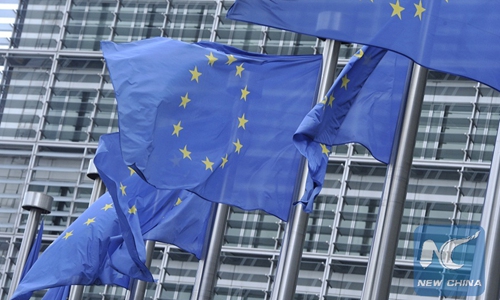HOME >> OPINION
Europe distancing itself from the US while moving closer to Russia
By Jin Feng Source:Global Times Published: 2020/1/24 11:50:06

File Photo: The European Union flags flutter in front of EU headquarters in Brussels, Belgium, on Oct. 12, 2012.(Xinhua)
German Chancellor Angela Merkel visited Moscow on January 11 and met with Russian President Vladimir Putin for nearly four hours. According to information revealed by German and Russian authorities, the atmosphere of the meeting was friendly, in contrast to the indifferent attitudes during the two leaders’ contacts over the last five years.
Moreover, the two leaders emphasized common grounds and achieved fruitful results. Putin expressed Moscow’s support for Berlin to host Libya cease-fire talks. The Berlin summit was successfully held on January 19.
Recently, a heated debate has been unfolding in Europe – which is the continent’s biggest problem, the US or Russia? Merkel has given her answer through her diplomacy.
The summit between Merkel and Putin focused on urgent issues, including the ongoing civil war in Libya, escalating tensions between the US and Iran, the Ukraine conflict and the Nord Stream 2 gas pipeline. Merkel’s visit can be seen as a thaw in ties between Germany and Russia, and even between Europe and Russia, since their relations were frozen in 2014.
Nowadays, the US is the most troublesome issue for the EU. After being bullied and ignored over and over, the EU has no alternative but to move closer to Russia.
Economically, the EU has been following the US in imposing sanctions on Russia since 2014, which has caused European countries huge losses. “The German economy has lost some $727 million in exports as a result of imposing sanctions against Russia and consequent counter-sanctions introduced by Moscow,” Sputnik News quoted an economist at the Kiel Institute for World Economics, a think tank based in Germany, as saying.
At the same time, the Europeans are increasingly worried that Russia will carry out more economic collaboration with China, which means Europe will not be able to regain its lost market. The US imposing sanctions on the Nord Stream 2 pipeline without considering the effect on its European ally has made Germany even angrier.
With regard to diplomacy and security, the US has been willfully and arbitrarily pushing the Middle East to the brink of a large-scale war, threatening the geopolitical security of Europe.
In the past two years, Europe has been expecting the US to change its mind and take the interests of its European allies into account. Yet Merkel, a sober-minded leader in Europe, has realized that the continent must rely only on itself when it comes to safeguarding or pursuing interests. This time, when West Asia and North Africa were in deep crisis, she chose to fly to Moscow instead of Washington for consultations.
Playing the diplomatic card can also help Merkel promote Germany’s influential role in international affairs and reduce the pressure she is facing domestically.
Voices questioning and opposing sanctions against Russia have been rising in Germany and a consensus has been formed among different parties – sanctions had failed to change Russia’s behavior and Berlin and Brussels must reevaluate their Russia policies. Merkel’s latest visit can thus be seen as a response to domestic pressure.
The Merkel-Putin summit in Moscow might signal that the EU’s policy toward Russia is changing and Brussels may ease sanctions against Moscow, paving the way for reconciliation between Europe and Russia.
Under mounting pressures piled on by Washington, thawing ties between Brussels and Moscow could raise the EU’s leverage when interacting with the US. Of course, this is something Washington is extremely unwilling to see.
The author is a research fellow at the Shanghai International Studies University. opinion@globaltimes.com.cn
Posted in: VIEWPOINT